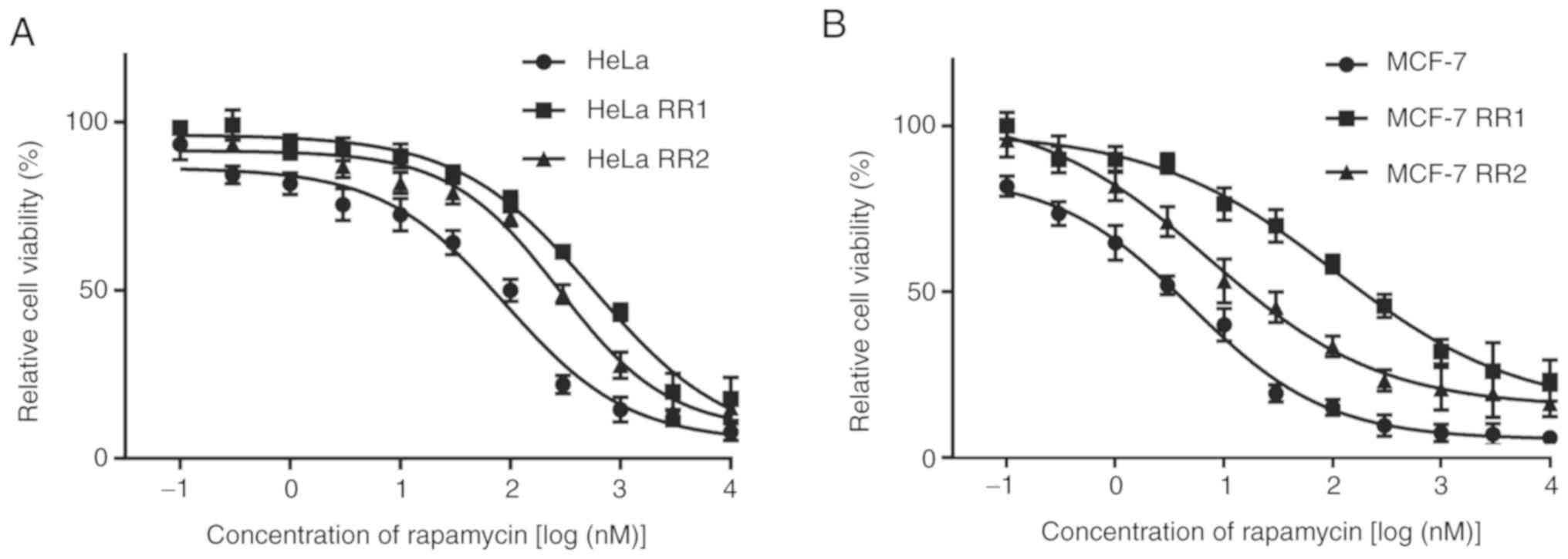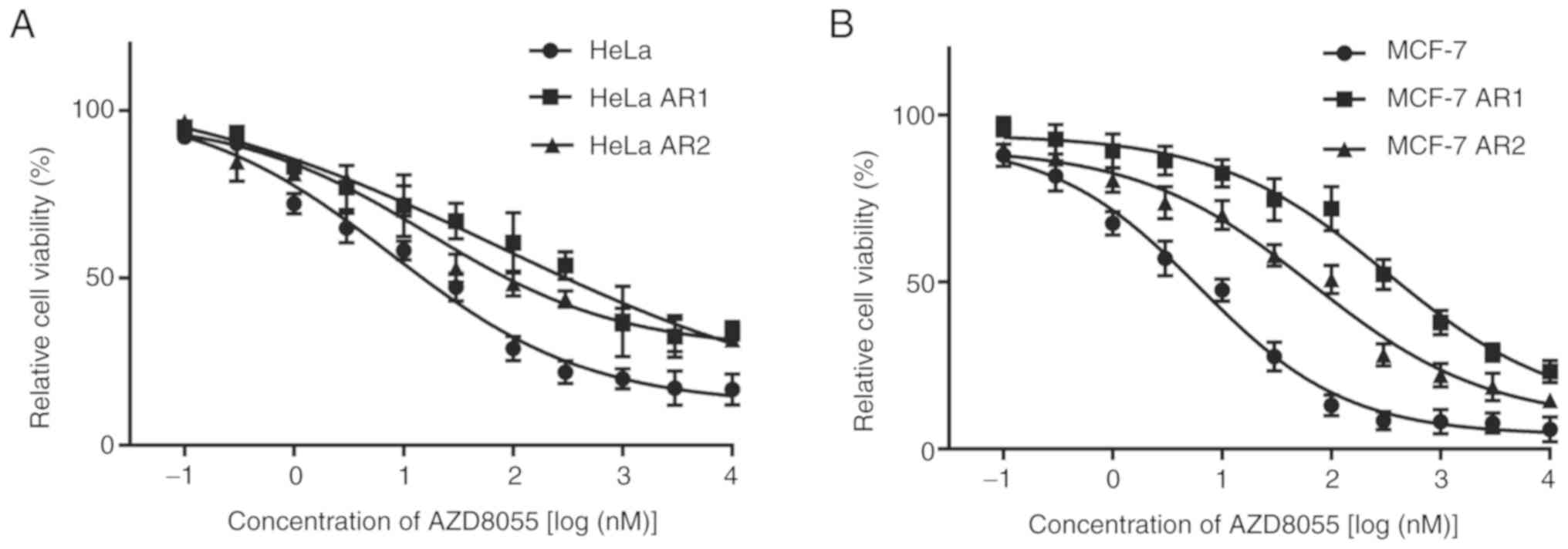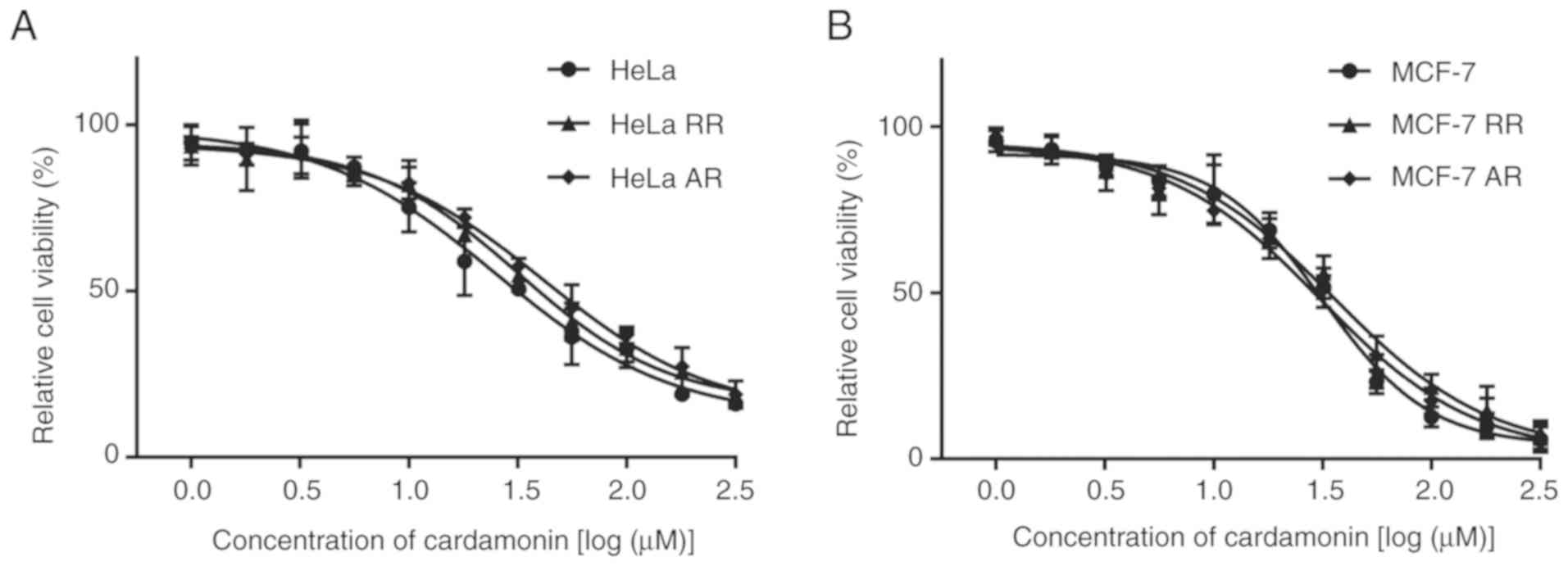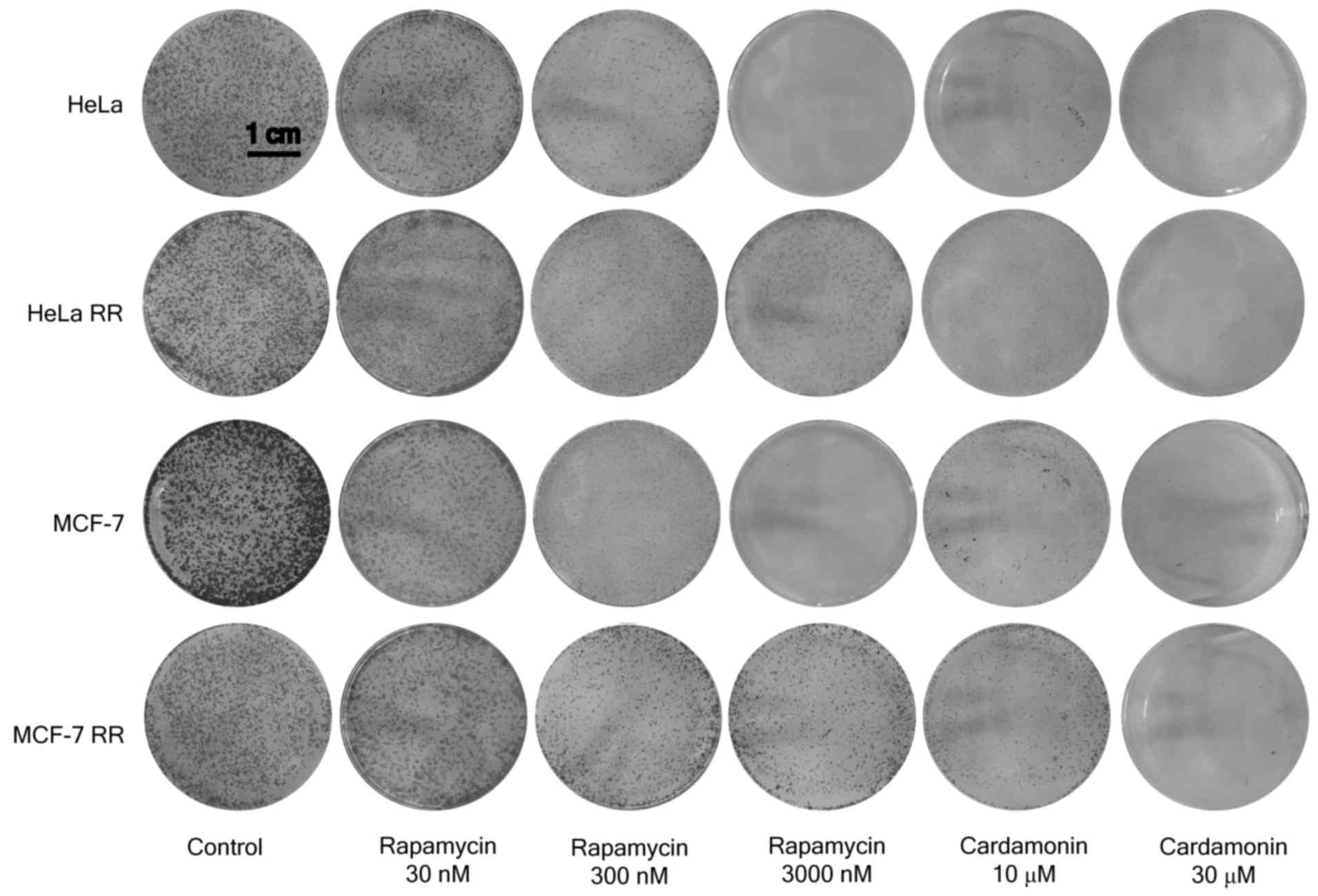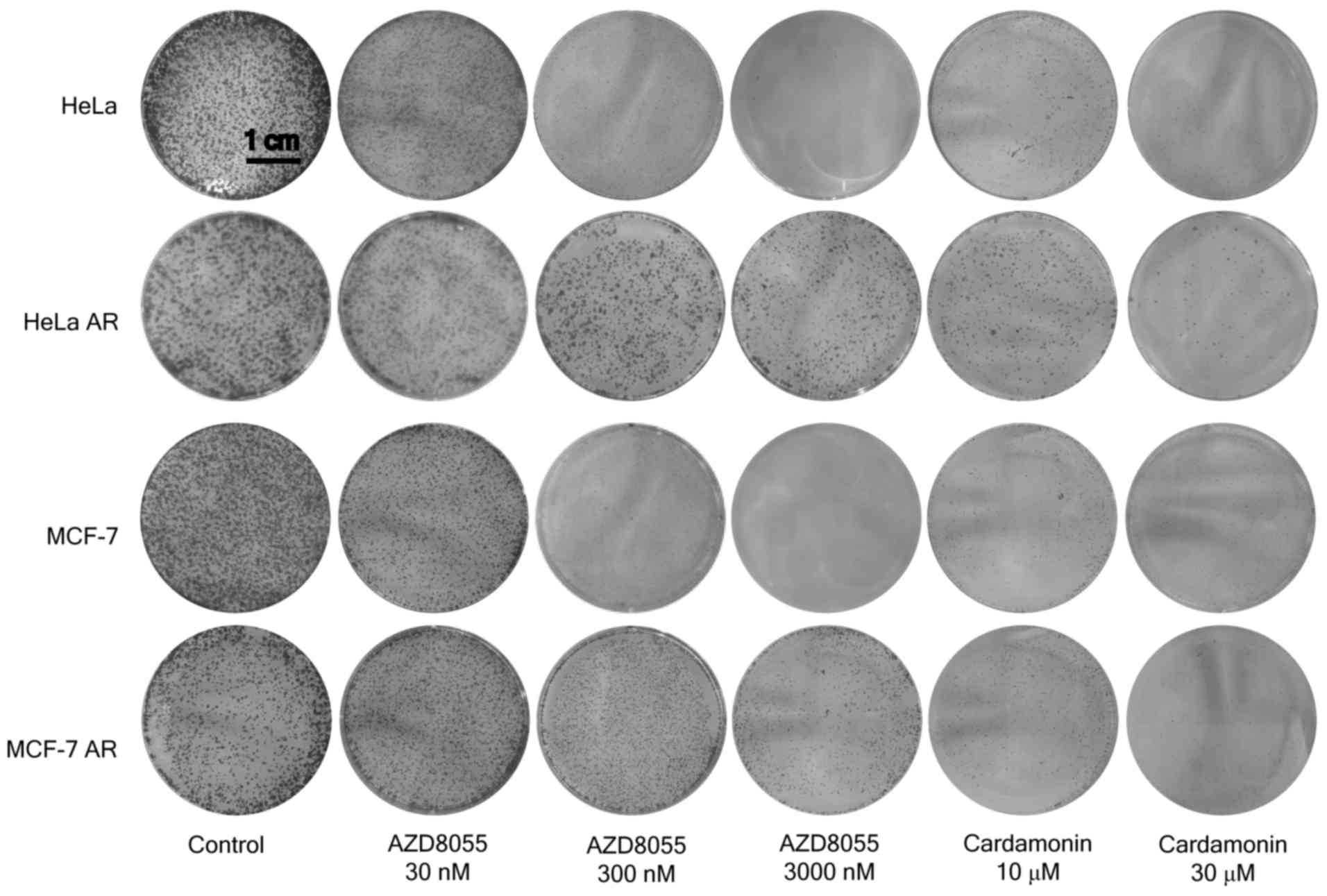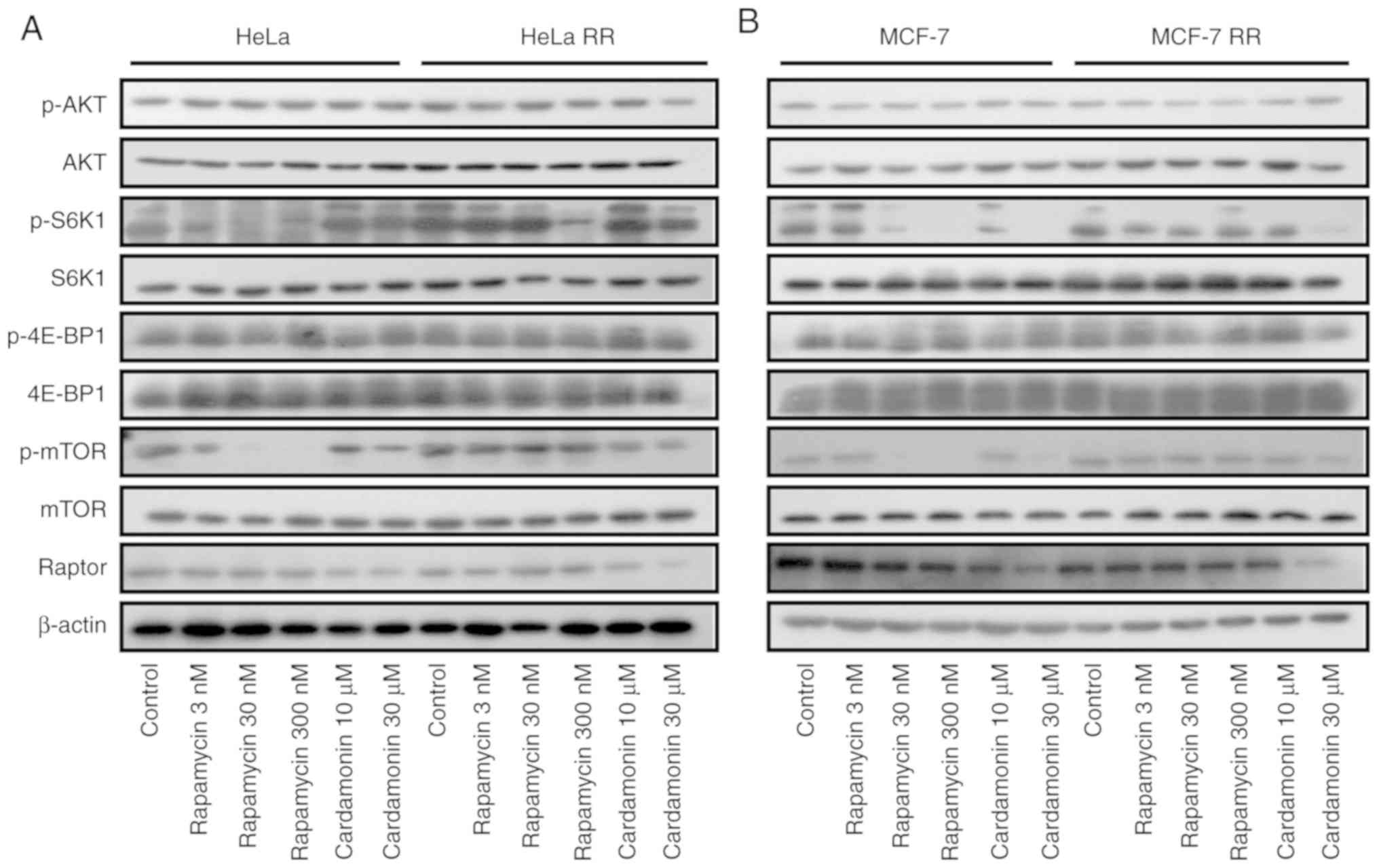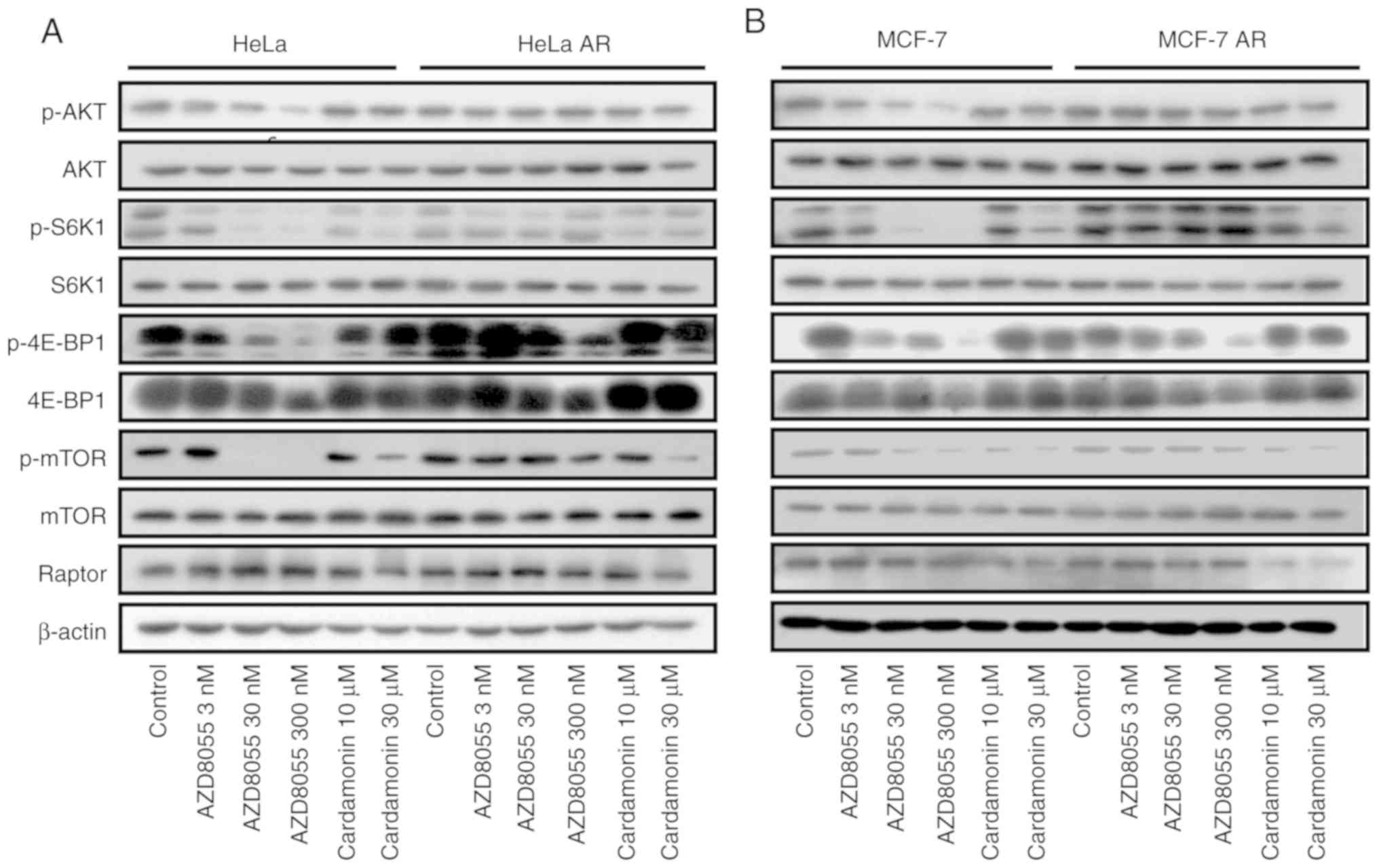|
1
|
Saxton RA and Sabatini DM: mTOR signaling
in growth, metabolism, and disease. Cell. 169:361–371. 2017.
View Article : Google Scholar : PubMed/NCBI
|
|
2
|
Mossmann D, Park S and Hall MN: mTOR
signalling and cellular metabolism are mutual determinants in
cancer. Nat Rev Cancer. 18:744–757. 2018. View Article : Google Scholar : PubMed/NCBI
|
|
3
|
Sabatini DM: Twenty-five years of mTOR:
Uncovering the link from nutrients to growth. Proc Natl Acad Sci
USA. 114:11818–11825. 2017. View Article : Google Scholar : PubMed/NCBI
|
|
4
|
Jordan NJ, Dutkowski CM, Barrow D, Mottram
HJ, Hutcheson IR, Nicholson RI, Guichard SM and Gee JM: Impact of
dual mTORC1/2 mTOR kinase inhibitor AZD8055 on acquired endocrine
resistance in breast cancer in vitro. Breast Cancer Res.
16:R122014. View
Article : Google Scholar : PubMed/NCBI
|
|
5
|
Barra F, Evangelisti G, Ferro Desideri L,
Di Domenico S, Ferraioli D, Vellone VG, De Cian F and Ferrero S:
Investigational PI3K/AKT/mTOR inhibitors in development for
endometrial cancer. Expert Opin Investig Drugs. 28:131–142. 2019.
View Article : Google Scholar : PubMed/NCBI
|
|
6
|
Li J, Kim SG and Blenis J: Rapamycin: One
drug, many effects. Cell Metab. 19:373–379. 2014. View Article : Google Scholar : PubMed/NCBI
|
|
7
|
Oshiro N, Yoshino K, Hidayat S, Tokunaga
C, Hara K, Eguchi S, Avruch J and Yonezawa K: Dissociation of
raptor from mTOR is a mechanism of rapamycin-induced inhibition of
mTOR function. Genes Cells. 9:359–366. 2004. View Article : Google Scholar : PubMed/NCBI
|
|
8
|
Yip CK, Murata K, Walz T, Sabatini DM and
Kang SA: Structure of the human mTOR complex I and its implications
for rapamycin inhibition. Mol Cell. 38:768–774. 2010. View Article : Google Scholar : PubMed/NCBI
|
|
9
|
Meng LH and Zheng XF: Toward rapamycin
analog (rapalog)-based precision cancer therapy. Acta Pharmacol
Sin. 36:1163–1169. 2015. View Article : Google Scholar : PubMed/NCBI
|
|
10
|
Owonikoko TK: Inhibitors of mTOR pathway
for cancer therapy, moving on from rapalogs to TORKinibs. Cancer.
121:3390–3392. 2015. View Article : Google Scholar : PubMed/NCBI
|
|
11
|
Chiarini F, Evangelisti C, McCubrey JA and
Martelli AM: Current treatment strategies for inhibiting mTOR in
cancer. Trends Pharmacol Sci. 36:124–135. 2015. View Article : Google Scholar : PubMed/NCBI
|
|
12
|
Wagle N, Grabiner BC, Van Allen EM, Hodis
E, Jacobus S, Supko JG, Stewart M, Choueiri TK, Gandhi L, Cleary
JM, et al: Activating mTOR mutations in a patient with an
extraordinary response on a phase I trial of everolimus and
pazopanib. Cancer Discov. 4:546–553. 2014. View Article : Google Scholar : PubMed/NCBI
|
|
13
|
Schenone S, Brullo C, Musumeci F, Radi M
and Botta M: ATP-competitive inhibitors of mTOR: An update. Curr
Med Chem. 18:2995–3014. 2011. View Article : Google Scholar : PubMed/NCBI
|
|
14
|
English DP, Roque DM, Carrara L, Lopez S,
Bellone S, Cocco E, Bortolomai I, Schwartz PE, Rutherford T and
Santin AD: HER2/neu gene amplification determines the sensitivity
of uterine serous carcinoma cell lines to AZD8055, a novel dual
mTORC1/2 inhibitor. Gynecol Oncol. 131:753–758. 2013. View Article : Google Scholar : PubMed/NCBI
|
|
15
|
Zhang Y, Jia QA, Kadel D, Zhang XF and
Zhang QB: Targeting mTORC1/2 complexes inhibit tumorigenesis and
enhance sensitivity to 5-flourouracil (5-FU) in hepatocellular
carcinoma: A preclinical study of mTORC1/2-targeted therapy in
hepatocellular carcinoma (HCC). Med Sci Monit. 24:2735–2743. 2018.
View Article : Google Scholar : PubMed/NCBI
|
|
16
|
Xu DQ, Toyoda H, Qi L, Morimoto M, Hanaki
R, Iwamoto S, Komada Y and Hirayama M: Induction of MEK/ERK
activity by AZD8055 confers acquired resistance in neuroblastoma.
Biochem Biophys Res Commun. 499:425–432. 2018. View Article : Google Scholar : PubMed/NCBI
|
|
17
|
Rodrik-Outmezguine VS, Chandarlapaty S,
Pagano NC, Poulikakos PI, Scaltriti M, Moskatel E, Baselga J,
Guichard S and Rosen N: mTOR kinase inhibition causes
feedback-dependent biphasic regulation of AKT signaling. Cancer
Discov. 1:248–259. 2011. View Article : Google Scholar : PubMed/NCBI
|
|
18
|
Chen H, Shi D, Niu P, Zhu Y and Zhou J:
Anti-inflammatory effects of cardamonin in ovarian cancer cells are
mediated via mTOR suppression. Planta Med. 84:1183–1190. 2018.
View Article : Google Scholar : PubMed/NCBI
|
|
19
|
Niu PG, Zhang YX, Shi DH, Liu Y, Chen YY
and Deng J: Cardamonin inhibits metastasis of lewis lung carcinoma
cells by decreasing mTOR activity. PLoS One. 10:e01277782015.
View Article : Google Scholar : PubMed/NCBI
|
|
20
|
Tang Y, Fang Q, Shi D, Niu P, Chen Y and
Deng J: mTOR inhibition of cardamonin on antiproliferation of A549
cells is involved in a FKBP12 independent fashion. Life Sci.
99:44–51. 2014. View Article : Google Scholar : PubMed/NCBI
|
|
21
|
Break MKB, Hossan MS, Khoo Y, Qazzaz ME,
Al-Hayali MZK, Chow SC, Wiart C, Bradshaw TD, Collins H and Khoo
TJ: Discovery of a highly active anticancer analogue of cardamonin
that acts as an inducer of caspase-dependent apoptosis and
modulator of the mTOR pathway. Fitoterapia. 125:161–173. 2018.
View Article : Google Scholar : PubMed/NCBI
|
|
22
|
Zhou X, Zhou R, Li Q, Jie X, Hong J, Zong
Y, Dong X, Zhang S, Li Z and Wu G: Cardamonin inhibits the
proliferation and metastasis of non-small-cell lung cancer cells by
suppressing the PI3K/Akt/mTOR pathway. Anticancer Drugs.
30:241–250. 2019. View Article : Google Scholar : PubMed/NCBI
|
|
23
|
Jin J, Qiu S, Wang P, Liang X, Huang F, Wu
H, Zhang B, Zhang W, Tian X, Xu R, et al: Cardamonin inhibits
breast cancer growth by repressing HIF-1α-dependent metabolic
reprogramming. J Exp Clin Cancer Res. 38:3772019. View Article : Google Scholar : PubMed/NCBI
|
|
24
|
Shi D, Niu P, Heng X, Chen L, Zhu Y and
Zhou J: Autophagy induced by cardamonin is associated with mTORC1
inhibition in SKOV3 cells. Pharmacol Rep. 70:908–916. 2018.
View Article : Google Scholar
|
|
25
|
Shi D, Zhu Y, Niu P, Zhou J and Chen H:
Raptor mediates the antiproliferation of cardamonin by mTORC1
inhibition in SKOV3 cells. Onco Targets Ther. 11:757–767. 2018.
View Article : Google Scholar : PubMed/NCBI
|
|
26
|
You W, Wu Z, Ye F and Wu X: Cardamonin
protects against adverse cardiac remodeling through mTORC1
inhibition in mice with myocardial infarction. Pharmazie.
73:508–512. 2018.PubMed/NCBI
|
|
27
|
Du L, Li X, Zhen L, Chen W, Mu L, Zhang Y
and Song A: Everolimus inhibits breast cancer cell growth through
PI3K/AKT/mTOR signaling pathway. Mol Med Rep. 17:7163–7169.
2018.PubMed/NCBI
|
|
28
|
Guerrero-Zotano A, Mayer IA and Arteaga
CL: PI3K/AKT/mTOR: Role in breast cancer progression, drug
resistance, and treatment. Cancer Metastasis Rev. 35:515–524. 2016.
View Article : Google Scholar : PubMed/NCBI
|
|
29
|
Dey N, De P and Leyland-Jones B:
PI3K-AKT-mTOR inhibitors in breast cancers: From tumor cell
signaling to clinical trials. Pharmacol Ther. 175:91–106. 2017.
View Article : Google Scholar : PubMed/NCBI
|
|
30
|
Tian T, Li X and Zhang J: mTOR signaling
in cancer and mTOR inhibitors in solid tumor targeting therapy. Int
J Mol Sci. 20(pii): E7552019. View Article : Google Scholar : PubMed/NCBI
|
|
31
|
Kapoor A and Figlin RA: Targeted
inhibition of mammalian target of rapamycin for the treatment of
advanced renal cell carcinoma. Cancer. 115:3618–3630. 2009.
View Article : Google Scholar : PubMed/NCBI
|
|
32
|
Hudes G, Carducci M, Tomczak P, Dutcher J,
Figlin R, Kapoor A, Staroslawska E, Sosman J, McDermott D, Bodrogi
I, et al: Temsirolimus, interferon alfa, or both for advanced
renal-cell carcinoma. N Engl J Med. 356:2271–2281. 2007. View Article : Google Scholar : PubMed/NCBI
|
|
33
|
Koh KX, Tan GH, Hui Low SH, Mohd Omar MF,
Han MJ, Iacopetta B, Soo R, Beloueche-Babari M, Bhattacharya B and
Soong R: Acquired resistance to PI3K/mTOR inhibition is associated
with mitochondrial DNA mutation and glycolysis. Oncotarget.
8:110133–110144. 2017. View Article : Google Scholar : PubMed/NCBI
|
|
34
|
Hassan B, Akcakanat A, Sangai T, Evans KW,
Adkins F, Eterovic AK, Zhao H, Chen K, Chen H, Do KA, et al:
Catalytic mTOR inhibitors can overcome intrinsic and acquired
resistance to allosteric mTOR inhibitors. Oncotarget. 5:8544–8557.
2014. View Article : Google Scholar : PubMed/NCBI
|
|
35
|
Rodrik-Outmezguine VS, Okaniwa M, Yao Z,
Novotny CJ, McWhirter C, Banaji A, Won H, Wong W, Berger M, de
Stanchina E, et al: Overcoming mTOR resistance mutations with a
new-generation mTOR inhibitor. Nature. 534:272–276. 2016.
View Article : Google Scholar : PubMed/NCBI
|
|
36
|
Santoni M, Pantano F, Amantini C, Nabissi
M, Conti A, Burattini L, Zoccoli A, Berardi R, Santoni G, Tonini G,
et al: Emerging strategies to overcome the resistance to current
mTOR inhibitors in renal cell carcinoma. Biochim Biophys Acta.
1845:221–231. 2014.PubMed/NCBI
|
|
37
|
Weisman R and Choder M: The fission yeast
TOR homolog, tor1+, is required for the response to starvation and
other stresses via a conserved serine. J Biol Chem. 276:7027–7032.
2001. View Article : Google Scholar : PubMed/NCBI
|
|
38
|
Grabiner BC, Nardi V, Birsoy K, Possemato
R, Shen K, Sinha S, Jordan A, Beck AH and Sabatini DM: A diverse
array of cancer-associated MTOR mutations are hyperactivating and
can predict rapamycin sensitivity. Cancer Discov. 4:554–563. 2014.
View Article : Google Scholar : PubMed/NCBI
|
|
39
|
Wagle N, Grabiner BC, Van Allen EM,
Amin-Mansour A, Taylor-Weiner A, Rosenberg M, Gray N, Barletta JA,
Guo Y, Swanson SJ, et al: Response and acquired resistance to
everolimus in anaplastic thyroid cancer. N Engl J Med.
371:1426–1433. 2014. View Article : Google Scholar : PubMed/NCBI
|
|
40
|
Earwaker P, Anderson C, Willenbrock F,
Harris AL, Protheroe AS and Macaulay VM: RAPTOR up-regulation
contributes to resistance of renal cancer cells to PI3K-mTOR
inhibition. PLoS One. 13:e01918902018. View Article : Google Scholar : PubMed/NCBI
|
|
41
|
Mateo F, Arenas EJ, Aguilar H,
Serra-Musach J, de Garibay GR, Boni J, Maicas M, Du S, Iorio F,
Herranz-Ors C, et al: Stem cell-like transcriptional reprogramming
mediates metastatic resistance to mTOR inhibition. Oncogene.
36:2737–2749. 2017. View Article : Google Scholar : PubMed/NCBI
|
















